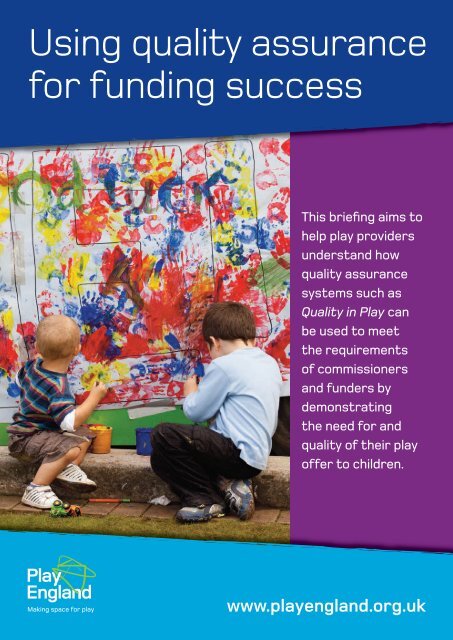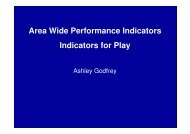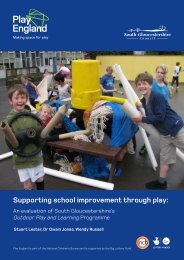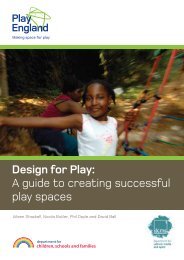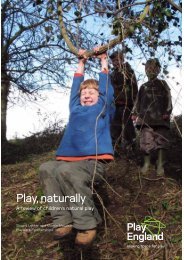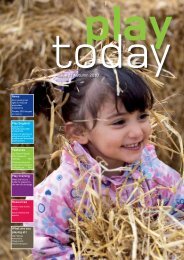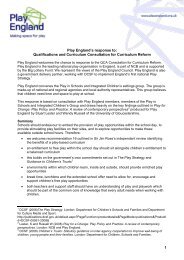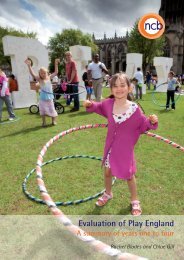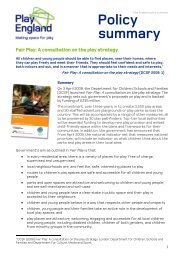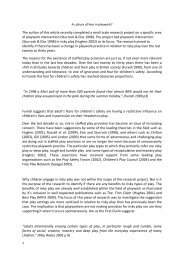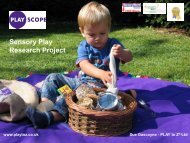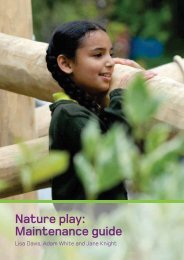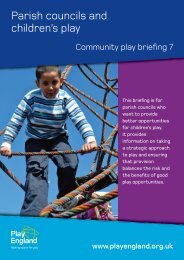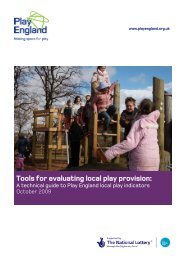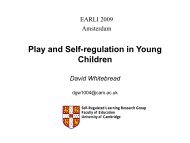Using quality assurance for funding success - Play England
Using quality assurance for funding success - Play England
Using quality assurance for funding success - Play England
Create successful ePaper yourself
Turn your PDF publications into a flip-book with our unique Google optimized e-Paper software.
<strong>Using</strong> <strong>quality</strong> <strong>assurance</strong><br />
<strong>for</strong> <strong>funding</strong> <strong>success</strong><br />
This briefing aims to<br />
help play providers<br />
understand how<br />
<strong>quality</strong> <strong>assurance</strong><br />
systems such as<br />
Quality in <strong>Play</strong> can<br />
be used to meet<br />
the requirements<br />
of commissioners<br />
and funders by<br />
demonstrating<br />
the need <strong>for</strong> and<br />
<strong>quality</strong> of their play<br />
offer to children.<br />
www.playengland.org.uk
Quality in <strong>Play</strong><br />
Quality in <strong>Play</strong> is not just a <strong>quality</strong> <strong>assurance</strong><br />
scheme – it is also a framework <strong>for</strong> analysis and<br />
development to help with sustainability in times<br />
of increasing competition <strong>for</strong> <strong>funding</strong>.<br />
Funders and commissioners are increasingly<br />
looking <strong>for</strong> evidence of need and outcomes that<br />
fit within their priorities. These may not be<br />
specifically about play, as they could be about<br />
support <strong>for</strong> children and families, or increasing<br />
access to natural environments or creating<br />
better neighbourhoods.<br />
Quality in <strong>Play</strong> can help you demonstrate how<br />
your provision fits wider <strong>funding</strong> priorities<br />
and how you will use the money to make a<br />
real difference. It will also show that you have<br />
good management systems in place and how<br />
you fit into the bigger picture of your local<br />
community.<br />
Quality in <strong>Play</strong> is divided into three sections<br />
based on the Manchester Circles model, showing<br />
how the physical environment, staff and<br />
organisational framework supports children<br />
in their play, and how you connect with the<br />
wider community and respond to local needs.<br />
It also helps make the case <strong>for</strong> children engaging<br />
in play as a good outcome in itself. It<br />
also contributes to other outcomes, like<br />
better physical and mental health through<br />
physical activity and being with friends, and<br />
improved community cohesion.<br />
Evidence of how play can contribute to a<br />
range of other outcomes can be found in<br />
the resources listed at the end of this briefing.<br />
‘For us as a <strong>funding</strong> body, QiP<br />
helps the team give evidence of<br />
their practice.’<br />
Healthy Borough Team officer<br />
‘QiP provides a measure to judge<br />
services against and aids<br />
developing <strong>quality</strong> provision. It<br />
helps to make the argument at<br />
different levels <strong>for</strong> support <strong>for</strong><br />
play and <strong>for</strong> the services by<br />
helping make links with other<br />
agencies. [Our] play centre had a<br />
good Ofsted report in response<br />
to good practice developed<br />
through QiP. It helps when trying<br />
to get <strong>funding</strong>.’<br />
Local authority play service manager *<br />
What is Quality in <strong>Play</strong>?<br />
Quality in <strong>Play</strong> is a <strong>quality</strong> <strong>assurance</strong> system <strong>for</strong> play providers<br />
to help supervised school age play and childcare provision in the<br />
voluntary, public and private sectors to improve their policy and<br />
practice in supporting children’s play.
‘Say what you do, and do what you say’<br />
Through a ‘cycle of commitment’ (planning ><br />
action > review) Quality in <strong>Play</strong> helps you to:<br />
• be clear about what it is you offer to children<br />
and families<br />
• show how you work within the <strong>Play</strong>work<br />
Principles and provide an accessible and<br />
inclusive service<br />
• effectively communicate this to the<br />
community, funders and other agencies<br />
• demonstrate that your policies and practice<br />
are up to date and focus on delivery<br />
• show that you are using a tried and tested<br />
evaluation tool<br />
• focus on outcomes (the difference you make)<br />
as well as outputs (what you do) and inputs<br />
(the money and resources you use).<br />
Section 1 of the Quality in <strong>Play</strong> manual:<br />
The play environment<br />
The <strong>quality</strong> areas in this section link the child’s<br />
right and need to play to how you develop the<br />
physical and human play environments. It helps<br />
to make the case <strong>for</strong> how a play project can<br />
meet <strong>funding</strong> priorities, including those that are<br />
not specifically about play. Most funders want to<br />
support disadvantaged children and families,<br />
and will often ask how you involve them in your<br />
service planning and delivery.<br />
Section 2: The organisational framework<br />
This section places reflective practice and<br />
work<strong>for</strong>ce development within the context of<br />
how the law and regulation is interpreted in<br />
practice, and covers project and resource<br />
management. This helps to show funders that<br />
their money will be in safe hands and that there<br />
are systems in place to deliver on and protect<br />
their investment.<br />
Section 3: The wider context<br />
This section links your aims and values to twoway<br />
communication with the community, other<br />
agencies and the bigger picture of how you<br />
support children and families in your area.<br />
Funders and commissioners increasingly want<br />
‘Our funders are more impressed<br />
with what we do; we can explain<br />
our achievements and make them<br />
more aware of what we offer and<br />
why we do it.’<br />
<strong>Play</strong>worker<br />
‘One of the strengths <strong>for</strong> me has<br />
been the ability to say on <strong>funding</strong><br />
bids: “we have QiP”. Some of the<br />
bigger trusts and foundations<br />
have asked: “do you have a <strong>quality</strong><br />
<strong>assurance</strong> certificate?” So it is<br />
very helpful to be able to say yes.’<br />
<strong>Play</strong>worker<br />
‘Now we are known in the<br />
community <strong>for</strong> being a good<br />
provider, we are oversubscribed.’<br />
Local authority playscheme coordinator<br />
‘Parents and children are happier,<br />
we provide more of what they<br />
want, and we link to other play<br />
services in the area, like the<br />
adventure playground and the<br />
city farm. We also organised our<br />
own fun days where we get the<br />
whole family involved. It raised<br />
awareness of what we do and<br />
helped us promote our service.’<br />
<strong>Play</strong>worker<br />
to know how you are responding to real<br />
community needs and how you can evidence this.<br />
They also want to see how you network with<br />
other agencies and funders, not least because<br />
very few funders will cover all the costs of<br />
your service.
<strong>Using</strong> Quality in <strong>Play</strong> evidence to bid <strong>for</strong> <strong>funding</strong><br />
The Quality in <strong>Play</strong> process is based around<br />
creating a portfolio of evidence. You will have<br />
most of the evidence already – going through the<br />
process is about getting it organised and<br />
reflecting on how policies and procedures are<br />
actually put into practice.<br />
Do use your portfolio to show what you do<br />
well. Funders will be interested in what<br />
return (including social benefits) they will<br />
get in return <strong>for</strong> their investment.<br />
Don’t be afraid to use your portfolio evidence to<br />
identify gaps in service provision and<br />
show how you could do more <strong>for</strong> the<br />
children and families that are in their<br />
priorities. This is what they want to fund –<br />
particularly where this shows how you<br />
could meet their priorities with some<br />
additional resources and how their<br />
investment could make a difference.<br />
Do include the costs of undertaking Quality in<br />
<strong>Play</strong> in your <strong>funding</strong> or commissioning bids<br />
as part of how you will evaluate the<br />
difference you will make with their money.<br />
As a tried and tested framework with an<br />
external assessment and accreditation<br />
element, it will help to reassure funders<br />
and commissioners that your evaluation<br />
will really tell the story of what difference<br />
you have made.<br />
Don’t <strong>for</strong>get that your funders and investors<br />
will also have to explain to their trustees<br />
or senior management what difference<br />
their money has made – your story is what<br />
they need.<br />
Funding: a changing future<br />
In these changing times there will be increasing<br />
pressure on play providers in the public, private<br />
and voluntary sectors to develop more businesslike<br />
models, to create social enterprise to fund<br />
core activities.<br />
Local authorities and other public bodies are<br />
much less likely to run grants programmes in<br />
future as they move to a commissioning model<br />
and new legislation requires them to consider who<br />
else is best placed to deliver services. This will<br />
mean competitive invitations to organisations to<br />
provide the services they have decided are<br />
priorities, rather than simply <strong>funding</strong> them to do<br />
what they have always done in the past.<br />
Charitable trusts and other grant-making bodies<br />
will continue to give grants but with a tighter<br />
focus on their particular priorities and areas of<br />
interest. Other trends in grant-giving that are<br />
likely to continue are a focus on outcomes (i.e.<br />
what difference you made) rather than outputs<br />
(i.e. how much you provided) and a reluctance to<br />
continue <strong>funding</strong> beyond the period of the grant.<br />
This means that play providers need to be very<br />
clear about how they fit into grant and commissioning<br />
priorities. <strong>Play</strong> providers also need to think<br />
about how they can use charitable or other<br />
grants to develop their service and capacity to<br />
the point where they are ready to bid <strong>for</strong> commissions.<br />
Some <strong>funding</strong> programmes support<br />
community organisations to build capacity and<br />
sustainability rather than direct services and can<br />
help with the costs of external support and<br />
expertise.<br />
Quality in <strong>Play</strong> provides a framework <strong>for</strong> developing<br />
your business case because it focuses on<br />
what you do, how you do it and how this fits in with<br />
the wider picture, in a way that will appeal to<br />
funders and investors. All the time ensuring the<br />
focus stays on the playing child.
Find out more about Quality in <strong>Play</strong>.<br />
www.playengland.org.uk/<strong>quality</strong><br />
Download A journey, not a destination, the Ludemos evaluation report on Quality in <strong>Play</strong>.<br />
www.playengland.org.uk/journey<br />
Engaging Communities in <strong>Play</strong> is a <strong>Play</strong> <strong>England</strong> programme offering a range of products and<br />
tools to increase the involvement of voluntary and community groups in shaping local play<br />
opportunities <strong>for</strong> children. For further in<strong>for</strong>mation visit<br />
www.playengland.org.uk/communityplay<br />
<strong>Play</strong>ful Communities is a dedicated website with a toolkit <strong>for</strong> anyone wishing to get involved in<br />
creating, improving and maintaining places where young people can play and spend their free<br />
time. The section on fundraising can be found here.<br />
www.playfulcommunities.org.uk/keeping_it_going/<strong>funding</strong>_and_sustainability.aspx<br />
The Children’s <strong>Play</strong> In<strong>for</strong>mation Service has a comprehensive selection of books, publications,<br />
articles and a photo archive on the history and development of play provision. A fundraising fact<br />
sheet can be found here.<br />
www.ncb.org.uk/cpis/resources/factsheets.aspx<br />
The <strong>Play</strong>day website has useful statistics and research data on what children and families say in<br />
a series of national polls.<br />
www.playday.org.uk<br />
The <strong>Play</strong>day ‘Get organised!’ guide has in<strong>for</strong>mation on <strong>funding</strong> sources.<br />
www.playday.org.uk/playday_events/resources.aspx#201GetOrganisedGuide<br />
<strong>Play</strong> <strong>for</strong> a change is a comprehensive review of the scientific literature on children’s play. A short<br />
briefing and a link to the full report is here. www.playengland.org.uk/play<strong>for</strong>achange<br />
<strong>Play</strong>, naturally is a review of the evidence <strong>for</strong><br />
the benefits of children playing in natural<br />
environments.<br />
www.playengland.org.uk/playnaturally<br />
The Demos report People Make <strong>Play</strong> looks at<br />
the impact of staffed play provision on children,<br />
families and communities.<br />
www.playengland.org.uk/peoplemakeplay<br />
Useful resources<br />
* The quotes in this briefing are taken from<br />
an external evaluation report<br />
A journey not a destination: evaluating the<br />
impact of Quality in <strong>Play</strong> (Ludemos, 2010)
This briefing was produced as part of <strong>Play</strong> <strong>England</strong>'s Engaging Communities in <strong>Play</strong><br />
programme funded by the Department <strong>for</strong> Education.<br />
For further in<strong>for</strong>mation about the Engaging Communities in <strong>Play</strong> programme visit<br />
www.playengland.org.uk/our-work/engaging-communities-in-play<br />
<strong>Play</strong> <strong>England</strong> promotes excellent free play opportunities <strong>for</strong> all children.<br />
We believe that all children should have the freedom and space to play enjoyed by previous<br />
generations.<br />
This involves more than just providing well-designed play areas; it requires the commitment<br />
of local and national decision makers to create more child-friendly communities.<br />
By making play a priority we can create healthier and happier communities <strong>for</strong> all.<br />
<strong>Play</strong> <strong>England</strong> is part of NCB and is supported by the Big Lottery Fund.<br />
Published by NCB, <strong>for</strong> <strong>Play</strong> <strong>England</strong>, March 2011.<br />
<strong>Play</strong> <strong>England</strong><br />
8 Wakley Street, London EC1V 7QE<br />
Tel: 0207 843 6300 Email: playengland@ncb.org.uk Web: www.playengland.org.uk<br />
Twitter: @playengland Facebook: www.facebook.com/playengland


